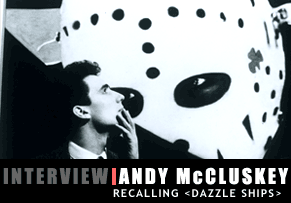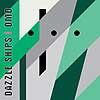

Swiss Radio International was removed from Dazzle Ships. Can you explain a little about that particular track and why it never made it to the final release?
 Well one of the things that was very intriguing when you're listening to a short wave radio is that every station has its call sign which it repeats at the top of its broadcast and at its closedown and it's its anthem. You know what station you're listening to by the call sign. They're often very jingly and very sweet and not dissimilar to ice cream van jingly sounds.
Well one of the things that was very intriguing when you're listening to a short wave radio is that every station has its call sign which it repeats at the top of its broadcast and at its closedown and it's its anthem. You know what station you're listening to by the call sign. They're often very jingly and very sweet and not dissimilar to ice cream van jingly sounds.
Obviously the album starts with Radio Prague and I had collected several others recorded off the radio, we did look into using others, obviously Radio Swiss International in particular, and they wouldn't give us permission because when we outlined what we were planning to do they said "Well you've got Prague and Tirana and various other Eastern Bloc stations, but it's not balanced with anything from the West. You haven't got Voice Of America or BBC or something. We consider ourselves to be a neutral station and since the majority of your album we feel is communist-leaning we will decline the use of our neutral call station because we don't feel that your album is balanced politically". Which was frustrating, but understandable.
Of course, without Radio Swiss International it just seemed there was no point loading it with a load of call signs, so in the end Radio Prague was the only one there. It was like.. we've been listening to short wave radio, this is a call sign, we don't need to have any more and the fact that it topped the album, that it started the album.. it essentially it sets the tone, it creates the colour: This is an album that is going to be political, that has radio recordings on it. It's almost the manifesto for the album.
Another thing that's interesting about Dazzle Ships is the fact that it relies on some ideas - such as the use of short wave radios - that influenced the very early days of OMD. I'm just wondering would you ever go back and try to recreate this kind of sound on future projects? Or is it something that you've moved away from completely?
I think the sound of the very early things that Paul Humphreys and I wrote were primarily influenced by two things: what we could get our hands on and what we were listening to.
So we were making things out of tubes of cardboard and pipes and microphones and Paul was making electronic gizmos that he'd seen circuit diagrams for in magazines. So we were by default very ambient and abstract and, for lack of a better word, experimental because we were just making noises because that's all we could do. Once we managed to start getting tuned instruments like a bass guitar or a keyboard then obviously it changed.
Obviously as time's gone by I mean I have difficulty with this idea of experimental music. When I was young it was exciting - I wanted to do something different. A lot of teenagers want to do something different, they're trying to work out who they are by their music or their haircut or their clothes or whatever. So I like the idea that we were trying to push the musical envelope because the reality is that experimenting in music when you get older just seems to be "Why are you doing that? What's the point of that?". So you listen to something and go "Oh that's an interesting idea. Oh I haven't heard that before". Do you want to hear it a second time? "No" (laughs). You're going "No I got the idea, thanks, that was it. Because all it is is an idea so it's been expressed to me now and I don't need to hear it again".
 Because really good music bears repetition, bears considerable repetition because it has a depth and an emotive quality and hidden layers that take you a while to explore and discover and it keeps on delivering so that's a long answer. Because I don't have the mentality I had when I was 16 years old. Making music that was designed to be different just for difference's sake.
Because really good music bears repetition, bears considerable repetition because it has a depth and an emotive quality and hidden layers that take you a while to explore and discover and it keeps on delivering so that's a long answer. Because I don't have the mentality I had when I was 16 years old. Making music that was designed to be different just for difference's sake.